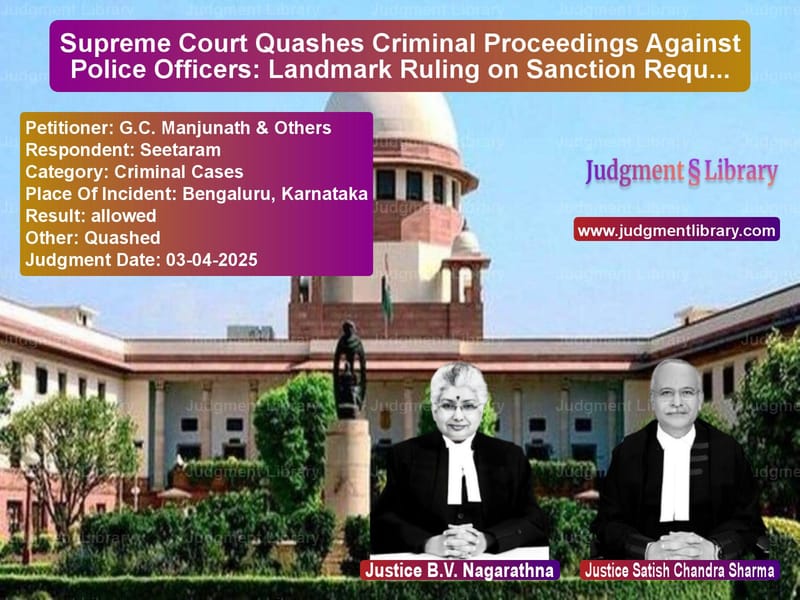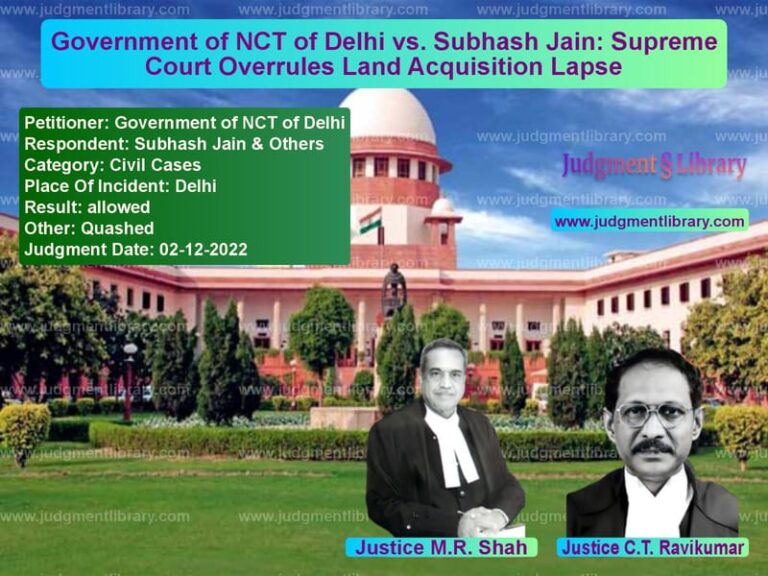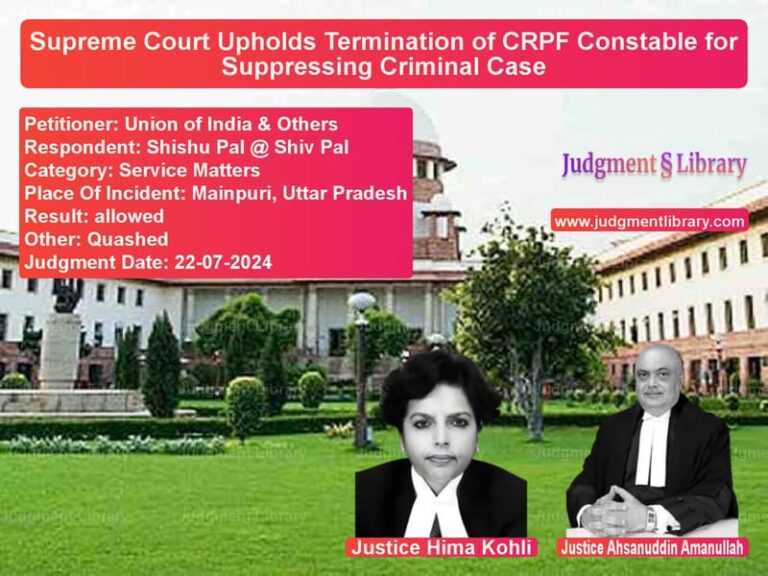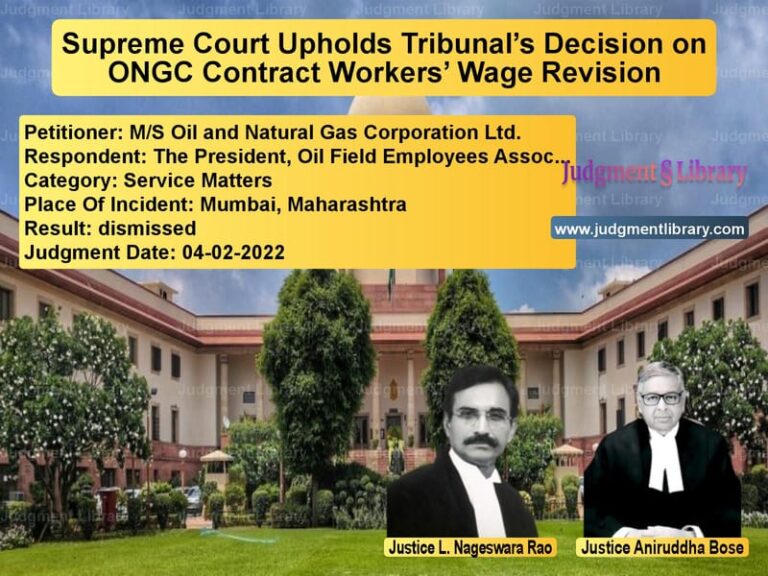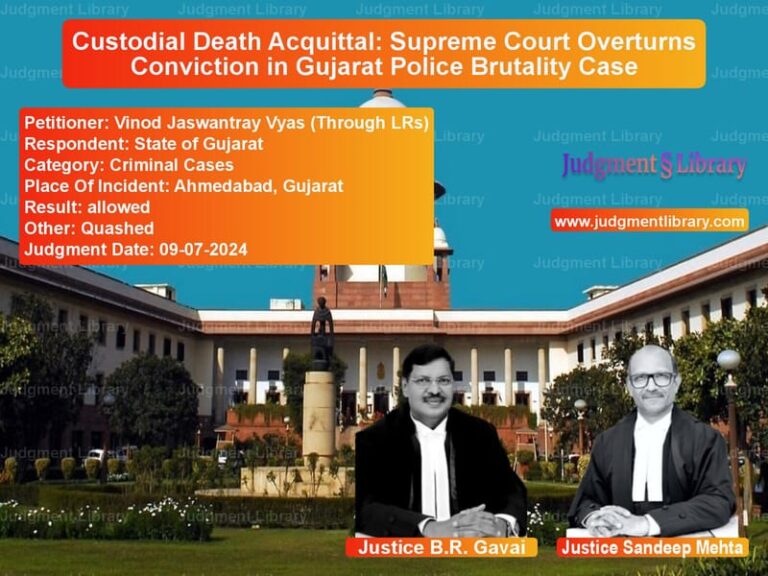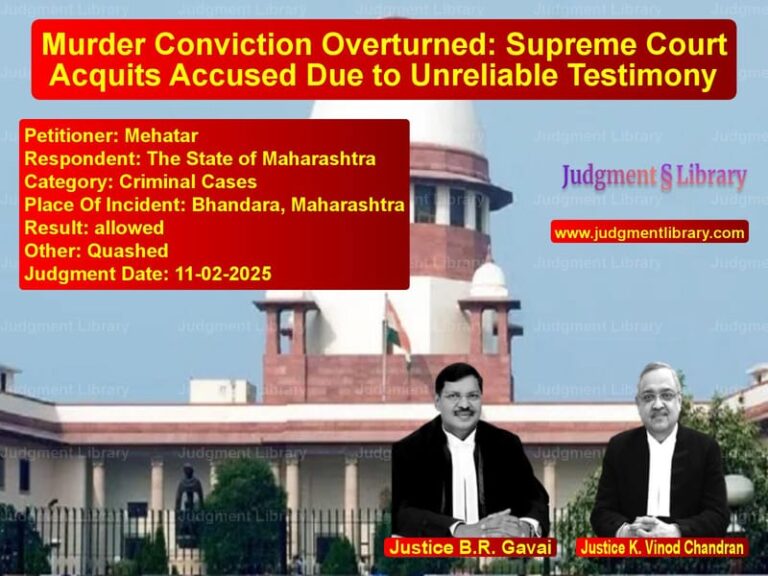Supreme Court Quashes Criminal Proceedings Against Police Officers: Landmark Ruling on Sanction Requirements
In a significant judgment delivered on April 3, 2025, the Supreme Court of India quashed criminal proceedings against retired police officers in the case of G.C. Manjunath & Others vs. Seetaram. The Court’s ruling provides crucial clarification on when prior government sanction is required under Section 197 of the Criminal Procedure Code (CrPC) and Section 170 of the Karnataka Police Act before prosecuting public servants. This complex case, spanning over two decades, involved serious allegations of police brutality and abuse of power.
Case Background: A 25-Year Legal Battle
The dispute originated in 1999-2000 when the respondent/complainant, Seetaram, alleged that several police officers from Mahalakshmi Layout Police Station in Bengaluru:
- Fabricated criminal cases against him
- Physically assaulted and tortured him in custody
- Stripped him naked and took photographs to humiliate him
- Stole his personal belongings including cash and jewelry
- Published defamatory material against him in a local magazine
The complainant filed a private complaint in 2007, which led to summons being issued against the police officers in 2016. The officers challenged these proceedings all the way to the Supreme Court, primarily on the ground that prior sanction for prosecution was not obtained as required by law.
Key Arguments Presented
Appellants’ (Police Officers) Submissions
The senior counsel for the appellants made several crucial arguments:
On Sanction Requirement:
“The expression ‘under colour or in excess of any such duty’ in Section 170 of the Police Act is particularly significant. Even if we exceeded our authority, the acts were done under color of official duty and thus require prior sanction.”
On Delay:
“The complaint was filed in 2007 for alleged incidents in 1999-2000 – an unexplained delay of 7-8 years. This clearly shows it was a retaliatory measure after the complainant was acquitted in other cases in 2006.”
Legal Precedents Cited:
The appellants relied heavily on:
1. Virupaxappa Veerappa Kadampur vs. State of Mysore (AIR 1963 SC 849)
2. D. Devaraja vs. Owais Sabeer Hussain (2020) 7 SCC 695
Respondent’s (Complainant) Submissions
The complainant’s counsel countered with equally compelling points:
On Nature of Acts:
“The accused officers stripped the complainant naked, assaulted him with lathis and iron rods causing grievous injuries including broken teeth – these barbaric acts can never be part of official duty.”
On Sanction Efforts:
“The complainant made consistent efforts from 2002-2006 to obtain sanction through multiple representations to authorities, but received no response. The State’s inaction shouldn’t prejudice the victim.”
Medical Evidence:
“The wound certificate and X-ray reports conclusively prove grievous injuries, corroborating the torture allegations. This isn’t about official duty excesses but outright criminal behavior.”
Supreme Court’s Detailed Analysis
Justices Nagarathna and Sharma delivered a comprehensive 42-paragraph judgment examining multiple legal aspects:
On Sanction Requirements
The Court analyzed Sections 197 CrPC and 170 of Karnataka Police Act in depth:
Verbatim Excerpt:
“The protective umbrella of Section 170 is not confined solely to acts strictly within the bounds of authority but extends to acts done ostensibly in excess of such authority, so long as there exists a reasonable nexus between the act complained of and the discharge of official functions.”
The Court emphasized that the key test is whether there’s a “reasonable connection” between the alleged act and official duties, not whether the act was proper or within limits.
On Judicial Precedents
The judgment extensively discussed several landmark cases:
- B. Saha vs. M.S. Kochar (1979) 4 SCC 177 – Established the “reasonable connection” test
- D. Devaraja case – Clarified that even excessive actions may require sanction if connected to duty
- Gurmeet Kaur vs. Devender Gupta 2024 – Recent reaffirmation of sanction principles
Key Observation:
“This Court in D. Devaraja observed that not every offence committed by a police officer automatically gets this protection… The protection is available only when the alleged act done by the public servant is reasonably connected with the discharge of his official duty.”
Application to Present Case
The Court noted several crucial factors:
- The complainant was a “rowdy sheeter” with multiple criminal cases
- The alleged acts occurred during investigation of those cases
- Two accused had already retired (in 2015 and 2020)
- Three accused had passed away during proceedings
Court’s Conclusion:
“We are of the considered opinion that the learned VII Additional Chief Metropolitan Magistrate erred in taking cognisance of the alleged offences against the accused persons without the requisite sanction for prosecution… The absence of the necessary sanction vitiates the very initiation of criminal proceedings.”
Final Judgment and Implications
The Supreme Court:
- Allowed the appeal and quashed all proceedings against surviving accused
- Set aside the High Court’s order upholding the summons
- Highlighted that retired officers (now aged 64 and 71) shouldn’t face prolonged litigation
This judgment provides important clarity on:
- The wide protection given to public servants for official acts
- The “reasonable connection” test for sanction requirements
- How courts should balance accountability with protection from vexatious litigation
The ruling is likely to have significant impact on future cases involving allegations against police officers and other public servants, particularly regarding the mandatory sanction requirement before prosecution.
Petitioner Name: G.C. Manjunath & Others.Respondent Name: Seetaram.Judgment By: Justice B.V. Nagarathna, Justice Satish Chandra Sharma.Place Of Incident: Bengaluru, Karnataka.Judgment Date: 03-04-2025.
Don’t miss out on the full details! Download the complete judgment in PDF format below and gain valuable insights instantly!
Download Judgment: g.c.-manjunath-&-oth-vs-seetaram-supreme-court-of-india-judgment-dated-03-04-2025.pdf
Directly Download Judgment: Directly download this Judgment
See all petitions in Custodial Deaths and Police Misconduct
See all petitions in Bail and Anticipatory Bail
See all petitions in Fraud and Forgery
See all petitions in Extortion and Blackmail
See all petitions in Legal Malpractice
See all petitions in Judgment by B.V. Nagarathna
See all petitions in Judgment by Satish Chandra Sharma
See all petitions in allowed
See all petitions in Quashed
See all petitions in supreme court of India judgments April 2025
See all petitions in 2025 judgments
See all posts in Criminal Cases Category
See all allowed petitions in Criminal Cases Category
See all Dismissed petitions in Criminal Cases Category
See all partially allowed petitions in Criminal Cases Category

